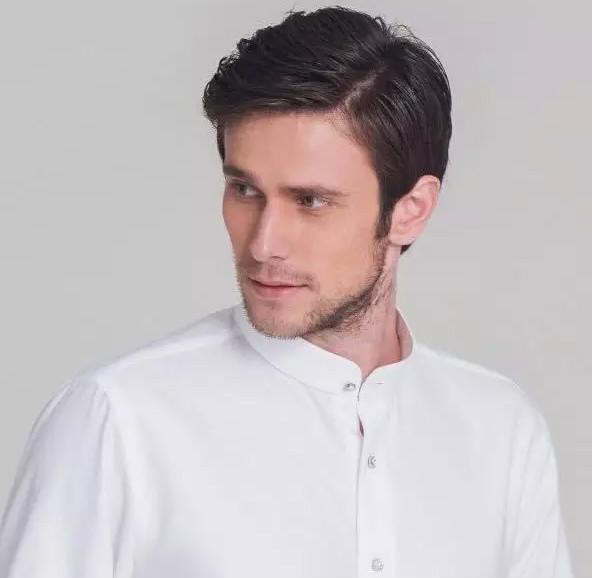Dialogue 1
Jingjing: Hey, Mark. Is that a new shirt?
京晶:嗨,馬克,那是一件新襯衣嗎?
Mark: This old thing? I've had it for years.
馬克:這件舊衣服嗎?我都穿了好幾年了。
Jingjing: I don't think I've seen it before.
京晶:我覺得以前沒見你穿過呢。
Mark: Well, I'm kind of a clothes horse—at least I used to be.
馬克:我差不多是個活衣柜(愛屯衣服的人),至少我過去是那樣的。
Jingjing: Now you could go for a year or more without buying any new clothes, right?
京晶:那現在你能一年多都不需要再買新衣服了吧?
Mark: Exactly. All I've bought in over a year were socks.
馬克:沒錯。我這一年多買的差不多全是襪子。
Jingjing: Is it easy to find your size here in China?
京晶:你穿的尺碼在中國好找嗎?
Mark: I'm pretty sure they only make one or two sizes.
馬克:我非常肯定它們只有一兩個尺寸。
Jingjing: Not just for socks, silly! I meant, can you find sizes for shirts and trousers?
京晶:是不是傻?我說的不光是襪子啦!我是說,你能不能找到合適你尺寸的襯衣和褲子?
Mark: Oh, that's pretty easy. Some of my foreign friends have trouble, though.
馬克:喔,那還挺容易的。不過我有的外國朋友們這方面就有麻煩了。
Jingjing: What's the trouble?
京晶:遇到了什么問題呢?
Mark: Some of my friends are heavyset, or quite tall, or both big and tall.
馬克:我有些朋友體格魁偉,或者太高,或者又高又大。
Jingjing: Big and tall folks should try the Silk Market.
京晶:又高又大的人們應該試試去秀水街買衣服
Mark: That's what I keep hearing. I'll recommend it to them.
馬克:我總聽人們這么說,那我跟他們推薦一下吧。
New words: 習語短語:
This old thing? I've had it for years.
這件舊的?我都穿了好久了
(This is a common stock expression, which someone uses after being flattered about something they're wearing.)
clothes horse (someone who has a large collection of clothes)
原本指用來晾曬衣服的晾衣架;現在多喻指愛時髦,喜歡買很多衣服的人,可譯為“活衣架”。有人說“女人的衣櫥是永遠塞不滿的。”
go for (a year) 持續……時間 (last for, i.e. I can go for three days without food.)
silly 傻的 (shortened form of silly guy)
big and tall folks 高大魁梧的家伙 (people who have larger than average bodies) (A big and tall shop is a retailer who specializes in larger clothing sizes.)

Dialogue 2
Jingjing and Mark talk later in the same day.
這天晚些時候,馬克和京晶又聊起來了
Jingjing: I was wondering, are the sizes much different in the US?
京晶:我在想,在美國,這些衣服的尺寸有很大的不同嗎?
Mark: Well, they use small, medium, large and extra-large for most casual clothes.
馬克:是這樣的,他們用small(小), medium(中), large(大) and extra-large(加大)來標記大多數休閑類服裝。
Jingjing: That's the same as in China.
京晶:這跟中國是一樣的。
Mark: Yes, but you have to watch out. A medium in one brand can be as big as an extra-large in another.
馬克:是的,但是你還得小心。一個牌子的中號可能跟另一個牌子的加大號一樣大。
Jingjing: I guess it makes sense to try stuff on first.
京晶:所以我想,首先把衣服穿上身試是很有必要的。
Mark: Definitely. I've gotten some pretty good deals on clothes that were labelled with the wrong size.
馬克:那是必須的。我曾經買過不少物美價廉的的好衣服,但是碼標錯了。
Jingjing: Hmm. Do they ever use exact measurements?
京晶:那,他們會使用精確的尺寸量度嗎?
Mark: Suit jackets and blazers are measured by bust. That's done in inches. Actually, it's the same with trousers, for the waist and inseam.
馬克:西裝外套和休閑外套都用胸圍來量,使用英寸來標記。事實上,長褲也一樣,用腰圍和褲長來標記。
Jingjing: What about shoes?
京晶:那鞋子呢?
Mark: A shoe salesperson will know the European sizes. It's best to use those, because American sizes are just slightly different from Chinese sizes. So, it's better to tell them 38, 40, 42, and so on.
馬克:賣鞋的售貨員知道歐碼,最好是用它們,因為美碼和中國碼還略微有不同。所以最好跟他們說38碼,40碼,42碼,等等。
Jingjing: Go by European sizes for shoes—got it. Hey, how about women's clothes?
京晶:買鞋用歐碼,知道了。那女士服裝呢?
Mark: Well, for something semi-formal or formal, there are numbered sizes, usually from 6-12.
馬克:對于半正裝或正裝來說,有數字碼號,從6到12
Jingjing: I usually just try everything on before deciding.
京晶:我通常做決定之前都試個遍。
Mark: I just eyeball it, and am usually right about the size, even when buying for other people.
馬克:我僅靠目測,而且我通常都對,給別人買東西也一樣。
New words: 習語短語:
try stuff on 試穿衣服 (test-fit clothing items in the store before buying them)
bust 胸圍 (measurement around the chest, for fitting jackets)
waist 腰圍 (measurement around the waist, for fitting trousers)
inseam 褲長 (measurement of the length of a person's leg, for fitting trousers)
go by (European sizes) 用歐碼來丈量 (use European sizes as a reference)
eyeball (it) 目測 (take a look and estimate the shape and size of something)











